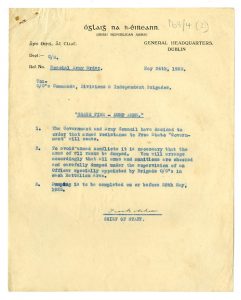End of the Civil War in Kildare, 24 May 1923

End of the Civil War in Kildare. 100 years ago today
James Durney
On 27 April 1923 Eamon de Valera announced that offensive operations by the anti-Treaty IRA were suspended to allow for peace negotiations. Three days later Frank Aiken, who had replaced Liam Lynch as Commander-in-Chief after the latter’s death, called for a ceasefire. Meanwhile, National troops from Naas scoured the Wicklow hills for active republicans, while raids, burnings and arrests continued throughout County Kildare. A joint meeting of the Republican Government and the IRA Executive on 14 May instructed Frank Aiken to end the war. The following day an anti-Treaty column, many of whom were escapees from Newbridge Barracks, were surrounded at Valleymount, Co. Wicklow, by a contingent of National troops from Naas. The leader of the column, Newbridge escapee Niall Plunkett O’Boyle, was killed in controversial circumstances and the rest of the men captured.
On 24 May Frank Aiken ordered that ‘the arms with which we have fought the enemies of our country are to be dumped. The foreign and domestic enemies of the Republic have for the moment prevailed’. Aiken’s announcement, known as the ‘dump arms order’ was published in less than a dozen national and local newspapers from 29 May to 2 June. The announcement was not carried by any of the three local newspapers in Co. Kildare.
In the aftermath of the ending of hostilities the dump arms order was not discussed at Kildare Co. Council meetings. The fortnightly meeting of the Naas Urban District Council was held on Tuesday evening, 5 June 1923, and two resolutions were put forward. Councillor Michael Fitzsimon was presiding, while also present were Cllrs. James Dowling and Mark Carroll, Town Clerk Joe Boyle, and Town Surveyor, Mr. Hall. The following resolutions were received with a request for adoption:
Rathdown Board of Guardians resolved: ‘That this Board, believing that the people would welcome a peace settlement which allowed political freedom of conscience, should urge upon other representative bodies to press in common with them for such a settlement.’
Carrick-on-Shannon No. 2 Council resolved: ‘That this Council welcome Mr. de Valera’s proclamation of readiness to negotiate a cessation of hostilities, and is fully in agreement with the principles put forward therein as a basis of peace. It is therefore resolved that this Council, recognise in the present proposals a practical stepping stone which will appeal to all those who supported the Treaty as a means to an end, hereby call upon all who love their country to support this peace movement, and accept Mr. de Valera’s proposals as an honourable and just means of restoring peace and unity to our beloved country. It is further resolved that this Council calls upon the Free State Government to meet, the peace overture in the same spirit in which it is made, by ordering an immediate cessation of hostilities at once opening negotiations for pence in accordance with the principles suggested. Copies of this resolution to be sent to all public bodies throughout the country.’
However, there was no agreement on how to proceed, but James Dowling said, ‘We all want peace, but I think this sort of resolution only does harm.’ The same resolutions had been proposed at a meeting of the Celbridge No. 2 District Council a week before, and again there had been no action taken on the motion. By that stage the Civil War had petered out, but deaths and arrests continued. The peace that followed was an uneasy one and the last execution by the authorities was carried out in June.
